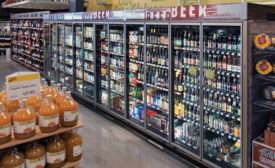Home » Refrigerated display cases
Articles Tagged with ''Refrigerated display cases''
Supermarkets across the country recognized for environmental leadership
Read More
Hillphoenix Earns Sixth EPA GreenChill Award
Company promotes the advantages of investing in sustainable refrigeration systems
September 28, 2016
Axiom to Install $5 Million Worth of Energy Storage at Grocery Stores in NYC
Refrigeration Battery helps control energy costs, prevent food spoilage during power outages
September 21, 2016
First UK Supermarket R-449A Installation Shows Energy Saving for Waitrose
Chemours Opteon XP40 provides savings for Devon store
Read More
Plaza Provision Installs Thermal Energy Storage to Cut Energy Costs
The company has saved over $650,000
September 19, 2016
Navigating the Aisles of Change
While changes keep coming for supermarkets, the HVACR industry keeps answering the call
Read More
Scanning the Supermarket and Restaurant Horizons
HVACR news and advances from two dynamic market sectors
Read More
New Supermarket Designed for Solstice N40
Reduced GWP refrigerant is for low- and medium-temperature refrigeration
September 5, 2016
Axiom Raises Funds to Meet Demand for Energy Storage in Refrigeration
Refrigeration Battery solution intelligently stores and deploys cooling to reduce peak energy demand
August 18, 2016
Natural Refrigerant Workshop Unites Supermarkets, Utilities
Utility incentives discussed to accelerate adoption of natural refrigerant technologies
August 15, 2016
Copyright ©2024. All Rights Reserved BNP Media.
Design, CMS, Hosting & Web Development :: ePublishing







